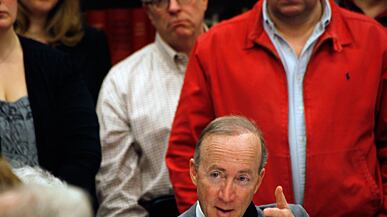One week of making the rounds as a possible presidential candidate, and Mitch Daniels is already digging himself out of a hole. Memo to Mitch: Get in or out, but do it soon. There’s such a thing as playing too hard to get, and it can be risky.
The Indiana governor’s high-profile speech last week in Washington about his education accomplishments, and his wife’s upcoming keynote address Thursday at a state Republican Party dinner, are among the strong signs that he is serious about jumping into the 2012 GOP race. The former federal budget director, a fiscal Paul Revere raising alarms about the $14.3 trillion national debt, has certainly received encouragement to run from some in his party and many in the media, including me.
Yet Daniels now has on his résumé one of those remarks that can haunt a candidate forever, like John McCain’s 2007 acknowledgment that he didn’t know a lot about the economy and Wes Clark’s flustered plea to his press secretary (“ Mary, help!”) when questions got tough on Day 1 of his 2004 campaign.
In Daniels’ case, the words were “ probably not”—his answer when New York reporters recently asked if he were prepared to debate President Obama on foreign policy. Daniels didn’t do much better a couple of days later, when asked to elaborate on his statement that despite the killing of Osama bin Laden, the struggle against terrorism continues. “I don’t think that’s all that deep a thought, really. I don’t know how much deeper I can go for you,” he said at the American Enterprise Institute.
The audience laughed, but some conservatives were not amused. Michael Warren of The Weekly Standard wrote a blog post under the headline “Daniels Vague, Self-Deprecating on National Security.” At Hot Air, the conservative blogger Allahpundit predicted that Democrats and Republicans alike would bludgeon Daniels over “probably not.” In very short order, Daniels found himself trying to live down the phrase. “I would spend a lot of time very promptly and be ready in plenty of time,” he told Bloomberg’s Al Hunt. “There’s no need for me to shoot my mouth off until I’m pretty confident I know what I think.”
The reluctant-candidate schtick did work for Washington, who really didn’t want to be president, and for Dwight D. Eisenhower. But it’s an unreliable strategy.

There’s little doubt Daniels can play catch-up on substance. His brainpower has never been in question. But if you want to be leader of the free world, it’s best to have a big footprint, a big story, a big personality. So far, when Daniels is asked about his plans to run or issues he’d face as president, he’s wrapped a hayseed persona around himself like a missile defense shield. He’s been so diffident and self-deprecating that you start to wonder if he’s capable of pulling off a Clark Kent transformation into a dynamic contender. In his AEI speech, for instance, he praised Obama on education, did not attack unions, and employed a nerdy PowerPoint presentation.
Scott Reed, who managed Bob Dole’s 1996 campaign and was advising Mississippi Gov. Haley Barbour, a good friend of Daniels’, until Barbour decided last month not to run, said Daniels has it in him to project dynamism. “He’s take-charge in Indiana. He totally runs that state,” said Reed, who has spent time there on business.
At home among the Hoosiers, the Daniels presidential trajectory seems familiar. Brian Howey, publisher of Howey Politics Indiana, says Daniels ramped up slowly to his first campaign for governor in 2004, gradually revealing an appeal that forced most other candidates out of the race. “If became kind of a draft-Mitch thing,” he recalled. “That’s the template that we’re seeing play out now. If he gets into the race, we’ll see the bravado come out.”
There is a myth, dating back to George Washington, that voters are entranced by the reluctant presidential candidate. Daniels is playing that to the hilt. Asked recently on Fox & Friends whether he would like to run, Daniels replied, “Would I like to? No. What sane person would like to?” He has said he tried and failed to get four other people to run and was considering it only because the “the country’s at a very perilous point arithmetically.” Daniels made sure to note that he was giving the race some thought “at the behest of a lot of people.”
The reluctant-candidate schtick did work for Washington, who really didn’t want to be president, and for Dwight D. Eisenhower, another general drafted into politics. But it’s an unreliable strategy.
Actor, lawyer, and former Sen. Fred Thompson was supposed to light up a lackluster Republican field in 2008. But Thompson’s late entry, light schedule, obvious dislike of campaigning (as if anyone really likes it) and theme of “ offering himself up” to a waiting nation left the impression that he didn’t want the nomination all that badly. Which in turn suggests that unless you’re a military hero, a founding father, or both, too much ambivalence is as off-putting to voters as too much desperation.
Clark, a retired general trying to follow the Washington-Eisenhower model, was supposed to save Democrats from their reputation as weak on national security. But waiting for a draft-Clark movement to gel turned out to be problematic. He had never run for anything before, and his late entrance gave him no time to make mistakes unnoticed. Daniels has campaign experience, but as any strategist will tell you, a presidential race is unlike any other. “Before you have a superstructure around you, before you are disciplined in the art of message delivery at the presidential level, you can say unguarded things that really can have an impact on your ability to win,” says Matt Bennett, vice president of the moderate Third Way think tank, who was Clark’s communications director. He puts “Mary, help!” and “Probably not” squarely in that category.
It goes without saying that challengers don’t know as much about national security as sitting presidents. But in contrast to Daniels, others in the race have educated themselves and are going after Obama’s policies. Former Massachusetts Gov. Mitt Romney traveled all over the world on business and as CEO of the 2002 Winter Olympics in Salt Lake City, and later visited Guantanamo Bay, Asia, Iraq, Afghanistan (twice), Israel (twice), and other Mideast nations.
Daniels and former Minnesota Gov. Tim Pawlenty each made seven overseas trade missions as governor. But Pawlenty traveled more widely (including to Iraq, Afghanistan, India, and Brazil) and racked up eight visits to National Guard troops (Daniels has made three).
The next GOP debate is not until June 13 in New Hampshire. That leaves plenty of time for Daniels to cram on foreign policy and demonstrate that “probably not” was false modesty. That is, if his first moments under the presidential klieg lights haven’t turned him by then from a reluctant candidate into a non-candidate.
Jill Lawrence is an award-winning journalist who has covered every presidential election since 1988. Most recently, she was a senior correspondent and columnist for PoliticsDaily.com. Her other positions have included national political correspondent for USA Today and national political writer at The Associated Press.






